Monologues And How To Write Them
Monologues And How To Write Them


Monologue is essentially just a long, tedious speech by one person during a conversation.
Good monologues are structured just like good stories: they have a beginning, a middle, and an end. This rhythm—a build up and a resolution—is critical in long stories, because without it, stories can become monotonous and stale.
1. BEGINNING: In real life, people don’t just start monologuing without a reason; they usually start speaking in response to something else that was said or to something that happened. When writing, try transitioning into a monologue smoothly with your first line. Even the opening line “I was thinking about something you said yesterday” is an easy way for a character to start giving a monologue.
2. MIDDLE: The middle of a monologue can be the hardest part to write, because viewers will start to get bored during long speeches; it’s vital to keep your monologues from being predictable. Craft small twists and turns into the storytelling—from interesting plot details to unique ways the character describes them—to keep the monologue fresh and engaging.
3. END: It’s common for monologues—especially ones meant to convince another character to do something—to wrap up with a quick statement of meaning. However, don’t indulge too much in explanation at the end of the monologue; this can make it feel shallow or uninteresting. Instead, trust your readers to derive meaning from it themselves
Monologue writing isn’t a way for writers to let loose and write without limits. In fact, monologue scripts should be written with special care and restraint, otherwise they can quickly bore viewers and fail to contribute anything to the character or plot. There are several key considerations you should keep in mind when writing a monologue:
1. The character’s backstory or importance to the storyline:
Monologues are supposed to reveal important details about a character or the plot—it’s essential that you’ve developed the speaking character and a detailed plot for them to inhabit, even before you start writing. Monologues help inform the audience about the character’s traits and past events.
2. The character’s motivation:
In real life, people don’t monologue unless they have a reason—in the same way, any character giving a monologue in a play or film should have a purpose for it.
3. The character’s voice:
First-time writers can be tempted to use monologues as a way to show off their writing skills; however, doing this will quickly pull viewers out of the story. There are many types of monologues a writer can explore, but monologues should feel natural and invisible in your story, which means they should be told in your character’s voice and point of view. Using language that sounds more authentically like your character is good writing, and it will help create an effective monologue.
4. Keep it concise:
Monologues aren’t something used to fill time in a script—so as you write a monologue, keep it as short as possible. This doesn’t mean that your monologue has to be short; rather, it means you should spend time editing and identifying what is most important. The more focused your monologue, the more powerful and memorable it will be for your viewers.
2. Placement is key:
Monologues are very potent writing tools, and too many of them too close together in a story will quickly tire viewers. Limit yourself to as few monologues as possible, and space them out in your story so that they’re not back to back. This will help each monologue shine and prevent the audience from getting bored.
3. Use detail:
Monologues written entirely in general language are usually forgettable—viewers need concrete details to latch onto and remember. Pepper your monologues with vivid imagery (when in doubt, think of the five senses) to make them memorable.
4. Read and watch more monologues: Great monologues are inspired by other great monologues—when you’re stuck, seek out other examples of monologues to get you back on track. William Shakespeare is always a good place to start (for example, after you’ve read Hamlet, look into A Midsummer Night’s Dream and Romeo and Juliet).
Hope this was helpful to you guys! Take care and thank you for all the love! Like, share and Follow for more!
More Posts from Dabriaanderlaine and Others
Negative Traits for Your Characters
Talks over others/interrupts
Always has to one-up others
Can’t take criticism
Always plays the victim
Selfish
Pathological liar
Makes everything about them
Bad at sharing
Guilt trips others
Makes special events about themselves
Their way or no way at all
Makes up excuses for everything
Has a reason why nothing is ever their fault
Not a team player
Does jobs halfway
Makes everything a joke
Can’t take a joke
Can’t let others enjoy anything
Stingy with money
Hi Neil, as someone who wants to write and can't bring themselves to write, despite loving writing and wanting to write; how do you write? Is there a magical way to make yourself write? Or is the truth more honest and genuine: that writing is the way to write?
I have half a novel, a deep desire to write, and an inability to make my fingers type the words.
How do I circumvent this? Or, as I suspect, is there truly no shortcut?
There's no shortcut. You polish a chair with your bottom, get through the backache and the bad days and you write it, one word at a time.
There's a post floating around the tumbls to the tune of "stop writing your characters like they're winning at therapy." The overall thrust of this "advice" seems to be that it's not interesting characterization or good fiction to write characters who already have good self-awareness and the ability to communicate with the people around them. The strong implication of the post was that self-awareness and therapy are boring, so don't put them to paper.
There's another post that's a kind of follow up, talking in a more nuanced way about how characters, like real-life people, may well have extreme difficulty 1) identifying the emotions they're having, much less 2) being able to talk about them, or 3) being willing or feeling safe enough to say it aloud. It's not such an intentionally quelling piece of direction about how to write effectively, but it still comes down on the side of "conflict makes for more interesting reading in the end."
The other implication of "this isn't good writing" is that those kinds of stories do not hold value, and that conflict has a very narrow meaning.
It's true that people grow up in all kinds of situations that affect their understanding of their feelings, much less their ability to communicate them or ask for help. Those folks may struggle alone for a long time before they are in a place where it's safe to slow down and think things through. Some folks may never get to that place, and it's important to read their stories and struggles.
It's true, too, that there are people who are naturally more self aware, who are able to speak up for themselves regardless of any past trauma or any ongoing anxiety disorder or whatever other thing might have otherwise hampered their insight and communication about their needs and desires. Their current success doesn't mean their story isn't worth penning.
Here's what the "don't write it, it's not realistic" crowd and the "don't write it, most people don't have these skills" folks fail to answer: why is it wrong to write and read stories where the characters behave like self-actualized people who love themselves enough to spend the time doing the work getting over their shit, and who love and respect the people around them enough to communicate clearly with them? Why is it wrong for a writer to give a reader a lens into a world where some people reach a point in their life where they don't have to deal with drama, understand why they feel a certain way, and take affirmative steps to solve their problems? Why is it wrong for some writers and readers to want a story where there isn't conflict, and where there is a calm, peaceful ending for everybody involved?
"Conflict's more interesting!"
Maybe, but it also contributes to stress, anxiety, depression, physical health issues, sleep disruption, anger issues, violence, crime, self-harm, and suicide. Acting like everyone ought to be writing conflict instead of healthy communication is racist, ableist, and classist as hell-- pretty mean-spirited, too, if all you care about is the drama. It's also incredibly intellectually lazy.
It's pretty rude to assume you know what all writers ought to write, or what all readers must read.
People write for all kinds of reasons, and people read looking for all kinds of things-- mirrors of their own life, but also windows with views onto something they might not have been able to imagine before reading your story.
Some people have already been through the wringer and did the work, and want to write a world where they can remind ourselves and other people that it's possible to do the work-- even when it's hard-- and end up on the other side of things in a better place. We've been through conflict, and we don't want anyone else to have to go through it, either. We want to share our tools and coping mechanisms and reframing devices so that others who are having a hard time while they are reading have at least one positive view that gives the reader permission. Stories that write about winning at therapy are important, because they say this:
"Go ahead, you're allowed. Acknowledge that what's happening to you isn't fair or healthy. Admit that you deserve better, because you know that the character in this story is like you and you can see clearly for them what's still hard to accept for yourself. Understand that you're not a failure for having strong feelings. Know that it's not selfish to take care of yourself and to read the books/see the therapists/erect the boundaries/take the meds you need in order to feel like life can be better."
Getting better and staying that way isn't boring or unrealistic, and neither is writing about it. One of the hardest stories I ever wrote was a story about communicating about mismatched needs. When it was done, I reread it and saw-- oh, I need to do the thing I just put my characters through the therapeutic exercise of figuring out for themselves. It was embarassing, to know myself better through fiction writing than through therapy-- but the process of writing let me figure out on paper what I wanted to happen. The kick in the teeth of realizing it wouldn't happen was what let me make a hard decision-- that my story gave me permission to make. And then I published the fic, which was more embarrassing because there were several folks IRL who realized what it meant for my offline life. I published it anyway, and few years ago, someone read the fic and commented something along the lines of: "I'm going to therapy and making X decision because of reading this fic."
My uninteresting story about a character telling another character that they needed to talk some things through and get help? It helped someone else. And it was a popular story, because lots of people who read it understood-- the struggle to understand yourself and your needs is one of the hardest conflicts all of us face, and coming out on the other end of it is a victory that we deserve to share with others, in the hope that they'll see a way through too.
So, dearly beloveds-- please be assured that you have at least one writer's permission to write boring, uninteresting stories about people who know how to solve their own problems and put on their own emotional oxygen mask before helping others. I, for one, can't wait to read your story and tell you how much I enjoyed it, and how happy I am that you're sharing that kind of success and the hope it might give to others.
Academic Rivals to Lovers:
(feel free to use! tag me when yall writee ;] requested by @field-mouse-queen and @indiansapphic )
"i don't agree with you!" "nobody asked you to."
arguments in hushed tones during lectures!!!!
^ "with this level of knowledge, i can probably-" "even with that level of whatever, you're still 5 feet 2." "HEY-"
sitting together to trash talk a professor you both mutually dislike
when they always sit at your spot in library, just so they could see you pissed off
"Are you reading?" "Are you blind?" "Heh, apparently you're. You're reading the book upside down, you moron."
"you like me now or what?" "i've learnt to bear your presence" *mimics them* "i've learnt to bear your presence"
being forced to work on a project together
"You're so stupid." "Yeah, I know."
"Why did you hurt yourself?" "None of your-" "Yeah, then fuck you. My bad for caring."
"hey-" "can you please not rub it in my face and leave?." "i just wanted to ask if you were okay.. "
attempting to comfort them when they're upset
"why do you care, [name]?" ".. you really don't know?"
"never have i ever liked my rival?" you search the room for their eyes, the glass is ALREADY RAISED TO THEIR LIPS.
"that mouth of yours does nothing but talk dumb shit?" "you wanna know what else it does?"
there's tension between them, sitting close while studying, arms grazing, pulling away of hands at the slightest touch :)
^ flustered, one asks, "what-? you're not interested in biomolecules?" the other whispers, "no, but i seem to be interested in you..," they come closer, "what have you done to me?"
"you know, love, I've always liked to win," they pause, "and I'd like to win one more thing--you."
"but they are not canon"
Do I look like I give a fuck










Espiritus de Invierno
The representations of the oldest masks are masks of animals, like those found in the paintings in the Lascaux cave in France. Some of these masks are still visible in contemporary rites around the world.
The correlation between the masks worn during these rituals and the anthropomorphic figurations of the Upper Paleolithic are striking. In many parts of Europe and especially in the Iberian Peninsula (Spain, Portugal and the Basque Country), archaic and mysterious figures regularly haunt carnival rites since the Middle Ages (but referring according to some specialists, like A.Darpeix, member of the historical and archaeological society of Perigord, to a distant shamanic and Neolithic antiquity).
They are masks adorned with skins of animals, vegetables and straw, surrounded by bells and bones,often crowned with horns and woods.
Thus arises the wild man within modern paganism as to symbolize the rebirth of nature emerging from winter. The figures are essentially ambiguous, as at the crossroads of nature and culture. Masks always speak of the mysteries of existence: in traditional societies, they were or still are the figure of ancestors and spirits of the dead, that of protective or evil spirits.
Starting Strong Scenes in Your Writing
Scenes are the fundamental building blocks of novels and short stories, and each one should propel a story toward the climax.
Generally speaking, your scene structure should mirror the story structure. In other words, take a novel-writing approach to a scene, crafting a beginning, middle, and end. Like a story, the beginning of a scene should have a strong entry hook that pulls the reader in.
Start with the setting. Often a new scene signifies a change in time and location. Establishing the setting at the top of a scene helps your readers get oriented. It also sets the tone and mood of what will unfold in the coming pages. A setting can serve as much more than a backdrop in literature. Have your scene take place somewhere that builds tension and hinders your protagonist. If you’re writing a thriller, describe a dark and foreboding place where the worst might happen. Be descriptive and use sensory details to make your setting come alive before you jump into the action.
Use visual imagery. In screenwriting, writers have to think in pictures. What images will excite an audience at the top of a scene? Your approach should be the same when writing any kind of fiction. As you write the opening of a scene, use descriptive language to engage a reader through detailed imagery. Think like a screenwriter as you’re writing scenes.
Drop the reader into the middle of the action. Hit the ground running by starting a great scene in media res. It doesn’t have to be a fight scene or a car chase, but physical movement creates momentum and builds tension in a story. It’s also a way to instantly engage a reader. Be sure you begin the scene before the high points of the action so you build up to the scene’s climax.
Write a character-driven scene opener. A good scene starts by giving characters a goal. Start by putting your protagonist in a situation that creates an obstacle or opportunity for both the scene and the overarching storyline. Try starting with dialogue, like an intense conversation between your POV character and a mystery character whose identity is revealed later in the scene. If you’re writing from an omniscient third-person point of view, consider starting a scene with a secondary character, even the antagonist, and use it as a chance for deeper character development.
Summarize past events. You might choose to use the beginning of the scene to do a quick recap of what’s brought your main character to this place and moment in time. A summary is especially helpful if you’re writing in third-person and a new scene switches to a different character. Take the opportunity to remind the reader where we left off. Instead of a straight-forward update, get creative. Go into deep POV and let a character’s thoughts provide the summary instead of the narrator. Be sure to keep this summary brief—just a line or two—so you can get back into the action.
Introduce a plot twist. The start of a new scene is a chance to pivot and take your story in a new direction. Start a new scene at a turning point in your story. Dive into a flashback or character’s backstory, revealing critical information that changes the course of the story going forward.
Keep the purpose of the scene in mind. Effective scenes are clear about what they set out to accomplish and how they contribute to the overall plot. They might include plot points or reveal important information needed to move a story forward. Establish your scene’s intention from the very first word and keep the rest of the scene on point.
Rewrite until you’ve found the perfect scene opening. When you’ve finished the first draft of a scene, go back and read it through. If your scene needs something, but you can’t figure out what, it might be how the scene starts. The best way to know if your opening works is by reading how it plays with the rest of the scene. Review the last paragraph and see if it ties back to your beginning. If the intro feels weak, rewrite it. Maybe your real opener is hidden in plain sight somewhere else in the body of the scene.
Make sure your opening scene is your strongest. While your entire book should be filled with compelling scenes that start strong, the very first scene of your book needs to lead the pack. This is the reader’s introduction to your story and where you’re revealing the characters, the setting, and kicking off the plotline with the inciting incident. This first scene has to hook the reader from the first line so they keep turning the pages.
Read a lot of books. If this is your first novel and you need some inspiration and ideas to help you start off your scenes, start by reading other books. Choose a book by a bestselling writer like Dan Brown or Margaret Atwood. Study the different ways they approach every scene. Reading other authors is a great way to hone your scene-writing skills.
Follow like and reblog if you find these helpful!
One thing White Collar gets absolutely right and very few other shows do, is that people React to guns.
The reaction varies, depending on their level of training/comfort with firearms, but there's no cool guy bravado* when someone pulls a gun, especially not from Neal. When he sees a gun he always always always reacts like things just got very serious, this is no longer fun and games.
And you know what? Yes please. It also ups the stakes for us when a character reacts to someone pulling a gun on them, and it's also highly realistic. I just really appreciate it that guns aren't a prop to signify "antagonist" but a weapon that should and does elicit fear.
* except for when Kate pulled a gun on Peter, and even then his reaction was warranted.
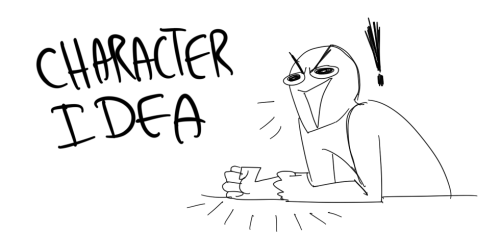
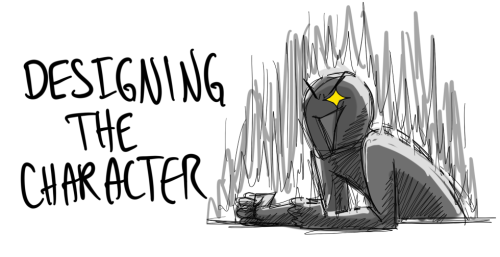
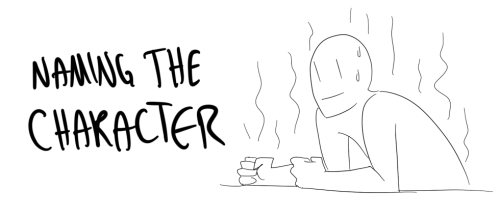
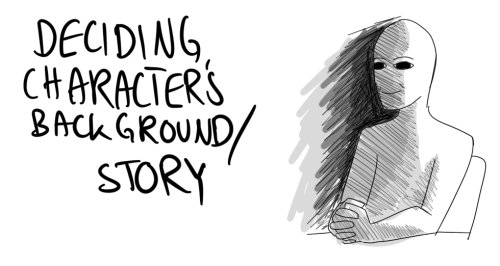
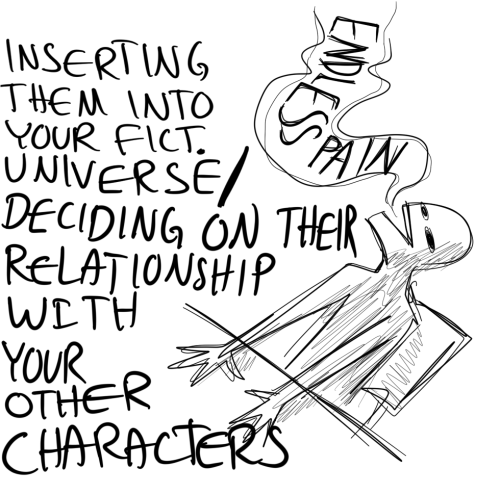
the suffering never ends
• An Oxford comma walks into a bar, where it spends the evening watching the television, getting drunk, and smoking cigars.
• A dangling participle walks into a bar. Enjoying a cocktail and chatting with the bartender, the evening passes pleasantly.
• A bar was walked into by the passive voice.
• An oxymoron walked into a bar, and the silence was deafening.
• Two quotation marks walk into a “bar.”
• A malapropism walks into a bar, looking for all intensive purposes like a wolf in cheap clothing, muttering epitaphs and casting dispersions on his magnificent other, who takes him for granite.
• Hyperbole totally rips into this insane bar and absolutely destroys everything.
• A question mark walks into a bar?
• A non sequitur walks into a bar. In a strong wind, even turkeys can fly.
• Papyrus and Comic Sans walk into a bar. The bartender says, "Get out -- we don't serve your type."
• A mixed metaphor walks into a bar, seeing the handwriting on the wall but hoping to nip it in the bud.
• A comma splice walks into a bar, it has a drink and then leaves.
• Three intransitive verbs walk into a bar. They sit. They converse. They depart.
• A synonym strolls into a tavern.
• At the end of the day, a cliché walks into a bar -- fresh as a daisy, cute as a button, and sharp as a tack.
• A run-on sentence walks into a bar it starts flirting. With a cute little sentence fragment.
• Falling slowly, softly falling, the chiasmus collapses to the bar floor.
• A figure of speech literally walks into a bar and ends up getting figuratively hammered.
• An allusion walks into a bar, despite the fact that alcohol is its Achilles heel.
• The subjunctive would have walked into a bar, had it only known.
• A misplaced modifier walks into a bar owned by a man with a glass eye named Ralph.
• The past, present, and future walked into a bar. It was tense.
• A dyslexic walks into a bra.
• A verb walks into a bar, sees a beautiful noun, and suggests they conjugate. The noun declines.
• A simile walks into a bar, as parched as a desert.
• A gerund and an infinitive walk into a bar, drinking to forget.
• A hyphenated word and a non-hyphenated word walk into a bar and the bartender nearly chokes on the irony
- Jill Thomas Doyle
-
 dolourstories liked this · 1 year ago
dolourstories liked this · 1 year ago -
 le-polyglotte03 reblogged this · 1 year ago
le-polyglotte03 reblogged this · 1 year ago -
 le-polyglotte03 liked this · 1 year ago
le-polyglotte03 liked this · 1 year ago -
 nenikou11 liked this · 1 year ago
nenikou11 liked this · 1 year ago -
 jellybeansandlaughter liked this · 1 year ago
jellybeansandlaughter liked this · 1 year ago -
 maenadite liked this · 1 year ago
maenadite liked this · 1 year ago -
 todo12mm liked this · 1 year ago
todo12mm liked this · 1 year ago -
 rosetoesinurnose liked this · 1 year ago
rosetoesinurnose liked this · 1 year ago -
 pebbleswritessometimes liked this · 2 years ago
pebbleswritessometimes liked this · 2 years ago -
 lulukaioken liked this · 2 years ago
lulukaioken liked this · 2 years ago -
 helloasha liked this · 2 years ago
helloasha liked this · 2 years ago -
 aplainrose liked this · 2 years ago
aplainrose liked this · 2 years ago -
 fb04 liked this · 2 years ago
fb04 liked this · 2 years ago -
 bibliophilicowl liked this · 2 years ago
bibliophilicowl liked this · 2 years ago -
 ncteenz3 liked this · 2 years ago
ncteenz3 liked this · 2 years ago -
 everlastent liked this · 2 years ago
everlastent liked this · 2 years ago -
 dabriaanderlaine liked this · 2 years ago
dabriaanderlaine liked this · 2 years ago -
 dabriaanderlaine reblogged this · 2 years ago
dabriaanderlaine reblogged this · 2 years ago -
 cerezzzita liked this · 2 years ago
cerezzzita liked this · 2 years ago -
 dysgraphicwriter reblogged this · 2 years ago
dysgraphicwriter reblogged this · 2 years ago -
 sheepasclouds liked this · 2 years ago
sheepasclouds liked this · 2 years ago -
 xaoticstuff reblogged this · 2 years ago
xaoticstuff reblogged this · 2 years ago -
 darkhorse-javert liked this · 2 years ago
darkhorse-javert liked this · 2 years ago -
 transman-badass reblogged this · 2 years ago
transman-badass reblogged this · 2 years ago -
 ghoulinferno liked this · 2 years ago
ghoulinferno liked this · 2 years ago -
 mariposa-bee liked this · 2 years ago
mariposa-bee liked this · 2 years ago -
 bigg1echeeeze-blog liked this · 2 years ago
bigg1echeeeze-blog liked this · 2 years ago -
 dahrlingrph reblogged this · 2 years ago
dahrlingrph reblogged this · 2 years ago -
 mysteriouslystrangetidalwave liked this · 2 years ago
mysteriouslystrangetidalwave liked this · 2 years ago -
 mochi-shortcake liked this · 2 years ago
mochi-shortcake liked this · 2 years ago -
 aeruthere reblogged this · 2 years ago
aeruthere reblogged this · 2 years ago -
 aeruthere liked this · 2 years ago
aeruthere liked this · 2 years ago -
 soonierulestheworld liked this · 2 years ago
soonierulestheworld liked this · 2 years ago -
 bingobongoxx liked this · 2 years ago
bingobongoxx liked this · 2 years ago -
 dchwt liked this · 2 years ago
dchwt liked this · 2 years ago -
 acren liked this · 2 years ago
acren liked this · 2 years ago -
 elritze liked this · 2 years ago
elritze liked this · 2 years ago -
 writingstuffnthings reblogged this · 2 years ago
writingstuffnthings reblogged this · 2 years ago -
 iamatriangle7 liked this · 2 years ago
iamatriangle7 liked this · 2 years ago -
 angelicistics liked this · 2 years ago
angelicistics liked this · 2 years ago -
 insomnia-miku reblogged this · 2 years ago
insomnia-miku reblogged this · 2 years ago -
 time-never-waits-for-me liked this · 2 years ago
time-never-waits-for-me liked this · 2 years ago -
 glacierbluehopes liked this · 2 years ago
glacierbluehopes liked this · 2 years ago -
 ellj92 liked this · 2 years ago
ellj92 liked this · 2 years ago
